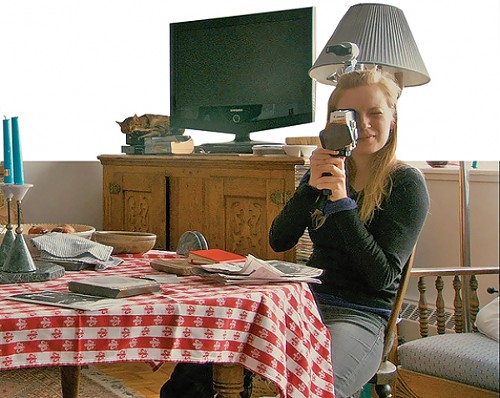In Stories We Tell, Sarah Polley has either crafted one of the most deeply narcissistic documentaries ever, or one of the most deeply poignant. The fact that I can’t quite decide which of those is true makes it frustratingly wonderful, or wonderfully frustrating, or probably both.
In the first place, it’s hard to imagine a subject as fraught with potential complications for any artist as her or his own life story. Stories We Tell finds Polley—the former child actor (The Adventures of Baron Munchausen) who has graduated to directing features like Away From Her and Take This Waltz—digging into the history of her family and, more specifically, her parents. She sits her dad, Michael, and her four older siblings in front of the camera to help reconstruct how Michael met Polley’s mother, Diane, when he was still a stage actor in Toronto; how their marriage evolved over the course of 13 years as Michael settled into a responsible career in the insurance industry and the effervescent Diane grew frustrated with his lack of ambition; and up through the events that led to Diane’s “surprise” pregnancy with Sarah that almost wound up being terminated.
That material alone is juicy enough, and fodder for plenty of ruminations on the multiple flukes, chance occurrences and changes of heart that wind up resulting in other human beings. But it’s even more complicated than that, because Polley is unable to quiz her mother the way she interrogates her other family members and various friends of the family. That’s because Diane Polley died of cancer when Sarah was just 11, leaving Sarah and her father alone, her older siblings already having moved out.
That might be the key piece of what’s going on here, because for all the chatter by the various interview subjects about subjective views of events in our lives, and turning those events as we perceive them into a story, Stories We Tell doesn’t feel as though it’s primarily a Rashomon-like endeavor about attempting to understand and process differing recollections of the same experiences. It’s about one particular person—Sarah Polley—attempting to understand and process what she didn’t experience, specifically, the majority of her mother’s life. As Polley allows information about Diane to trickle out into her narrative—as well as information about how the movie itself was made—she reveals a deeply personal mission at the core of the project. She’s attempting nothing less than the reconstruction of Diane’s existence, and some of the key experiences that defined Diane, so that she can understand the mother she barely got the chance to know.
It’s kind of heartbreaking watching Polley wrestle with that notion—yet it’s also kind of exasperating. Far from being an unobtrusive spectator in her own film, Polley becomes a character in it, and not just in the re-created scenes. She’s there as a director as well—her off-screen voice presenting her interview subjects with challenging questions, or sitting at the console in a recording studio, asking her father to reread specific lines from his own account of his life with Diane. Polley never stops underlining the reality that Stories We Tell is in many ways all about her. And while that’s a crucial part of what makes the movie emotionally raw, you’re still dealing with a director drawing attention to her own role in the process.
There’s no denying that for huge chunks of Stories We Tell’s running time, it’s a satisfying piece of filmmaking. Polley is savvy about how and when she portions out the revelations about her family history; she finds entertaining, emotionally affecting material both in what her interview subjects share about Diane and what they still find difficult to acknowledge. People are always more complex than what we see on the surface, Polley reminds us—and while that’s hardly an earth-shaking thesis statement, she presents it with the same skilled hand behind the camera that she has already shown in her fiction features.
It’s the hand in front of the camera that complicates things. As engrossing as it is watching Polley wrestle with the past, it’s also hard to watch her telling viewers, in effect, “Watch me wrestle with the past.”
STORIES WE TELL
Documentary
Rated PG-13
Speaking of ,
-
Walk of Shame, The Lego Movie
New DVD/VOD Tuesday, June 17
- Jun 16, 2014
-
Drinking-Class Zero
Following a night of drinking, Wendy Simpson, 25, walked to a McDonald’s restaurant in West Yorkshire, England, where she was told that the counter was closed and only the drive-through was open but that she couldn’t be served
- Jun 16, 2014
-
How to Train Your Dragon 2
Dragon 2 shows DreamWorks is still willing to be daring
- Jun 13, 2014
- More »
More by Scott Renshaw
-
Film Reviews: New Releases for April 12
Civil War, Escape from Germany, Coup de Chance, Hundreds of Beavers, La Chimera, Sting
- Apr 11, 2024
-
University of Utah School of Music premiere of A.L.I.C.E.
Composer connects the Lewis Carroll story to her experience living with autism
- Apr 10, 2024
-
Beavers and Spiders and Thieves, Oh My
Three new films cover a wide range of styles.
- Apr 10, 2024
- More »
Latest in Film Reviews
Readers also liked…
-
Power Plays
Two satirical comedies explore manipulations and self-delusions by those with power.
- Aug 31, 2022





